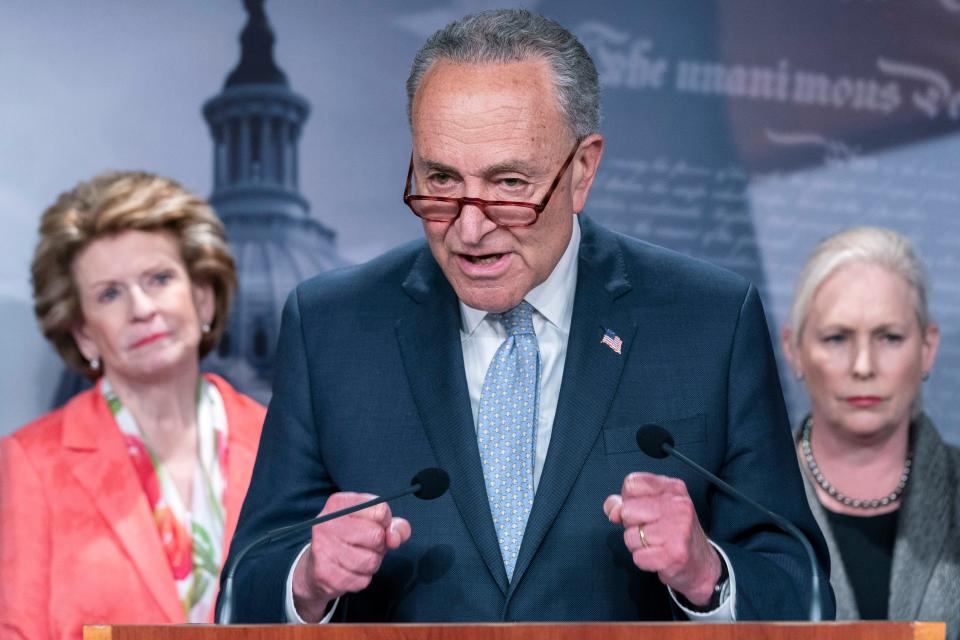'Urgent as it gets': Senate bill protecting abortion rights would bar waiting periods, arbitrary clinic regs. What else?
WASHINGTON – Senate Democrats are leading a vote this week they know will fail – a formality that's part of a larger effort to save Roe v. Wade by turning the ruling into the law of the land.
Majority Leader Chuck Schumer, D-N.Y., knows he doesn't have the 60 votes needed to overcome a filibuster. He may not even have the votes of all 50 Democrats to save abortion rights.
But he has a chance to show which side U.S. senators are on and who will vote for or against protecting the right to choose. He's going to make sure that's on record before the November midterm elections, when voters will ultimately decide which party controls Congress.
"This is real and as urgent as urgent as it gets," Schumer said last week.
Democrats are hoping a leaked draft of an opinion suggesting the Supreme Court will overturn Roe v. Wade will galvanize support for their party in the fall. Until last week, polls show Republicans poised to take back Capitol Hill because of rising inflation, President Joe Biden's low approval ratings and historical trends that typically go against the party of the sitting president.
A Democratic majority in Congress and a Democratic president also might be the only way to save abortion rights if the leaked Supreme Court draft opinion becomes a final ruling, upending nearly 50 years of legal precedent and letting states decide whether to allow the procedure and under what conditions.
Midterms: Could Roe fire up Democrats the way Joe Biden hasn’t? Maybe, but the GOP would be energized, too
What's in the Senate bill to save Roe v. Wade?

Senators will vote on the Women's Health Protection Act of 2022, a bill introduced by Sen. Richard Blumenthal, D-Conn., that would legalize abortion nationally and override state laws that restrict or ban the procedure.
Democrats say the bill is basic in that it gives patients the right to receive abortions and medical workers the right to provide them. It also prevents states from making it harder to have abortions, such as adding "medically unnecessary" mandatory waiting periods.
Several states, including Texas, Oklahoma, Mississippi and Arizona, have passed laws significantly restricting abortions without rape or incest exemptions.
The Senate bill would supersede those states and prevent all states from requiring "medically unnecessary" in-person visits before receiving abortion services. And it would prohibit states from going after clinics for not meeting arbitrary physical standards.
At least 33 states require patients to receive counseling before an abortion is provided, and 14 of those states require counseling to be in person, according to the Guttmacher Institute.
Blumenthal's bill is in line with the holdings in Roe v. Wade and Planned Parenthood v. Casey and wouldn't allow states to bar abortions after fetal viability without exceptions for the life or health of the patient. also would bar states from prohibiting abortion services before or after fetal viability.
Currently, 31 states require patients to be told the gestational age of the fetus and 27 states require information to be given on fetal development throughout pregnancy. And 13 states give patients information on the ability of a fetus to feel pain, with five states requiring that patients are told personhood begins at conception, according to the Guttmacher Institute.
The Senate bill also protects abortion providers' ability to offer services via telemedicine, an important healthcare tool in rural America.
It would keep states from enacting laws to prevent abortion providers from prescribing or dispensing drugs related to the procedures.
Sen. Susan Collins, R-Maine, who supports abortion rights, said she would not vote for the proposed bill because it goes too far.
"It supersedes all other federal and state laws...," she said to reporters Thursday. "It doesn't protect the right of a Catholic hospital to not perform abortions. That right has been enshrined in law for a long time."
Schumer didn't mention Collins by name but disagreed with her point during a press conference Thursday, saying the Senate bill gives providers the right to provide abortion care without medically unnecessary restrictions.
"Some are saying that this legislation would tell hospitals – certain religious hospitals – that they have to perform abortions," he said. "That is simply not true."
'Sense of urgency': Senate to vote Wednesday on bill that would make abortion legal nationally
What's not in the Senate bill to protect abortion rights

Aiming to attract more support from moderates for their legislation, Democrats have left some language out of this bill.
When the Senate held a procedural vote on an earlier version of the bill, the Women's Health Protection Act of 2021, it failed 46-48, with six senators not voting. Some Senators didn't like what they considered to be "controversial language" in the bill.
Blumenthal's bill removes "white supremacy" and "gender oppression" from the bill. It doesn't include text about abortion protections applying to both women and "transgender men, non-binary individuals, those who identify with a different gender, and others."
The Women's Health Protection Act of 2021 contained that language because the bill's sponsor, Rep. Judy Chu, D-CA, said it was a matter of reproductive justice. The bill described reproductive justice as a human right that will be achieved when all people have the resources and power to make decisions about their bodies.
But even with language changes, Democrats don't have 60 senators needed to overcome the filibuster and force a floor vote.
Sen. Elizabeth Warren, D-Mass., said lawmakers can't let the filibuster stand in their way.
"I'm MADDER than hell. And I'm determined to fight like hell," she said in a tweet Thursday.
Throughout last week she blasted Republicans for seating a bench confirming Supreme Court justices with the intent of overturning Roe and "force disproportionately low-income women to give birth" without also providing universal child care or paid family leave.
"They're not here to support families," she said to reporters. "They're here to push a radical agenda. We must call it out and fight back."
Races to watch: The Roe v. Wade decision could upend the midterms. Here's where it might matter most
Candy Woodall is a Congress reporter for USA TODAY. She can be reached at cwoodall@usatoday.com or on Twitter at @candynotcandace.
This article originally appeared on USA TODAY: Abortion bill: What the Senate is voting on that could save Roe v. Wade

